
The Best VPN for Torrenting in 2025: P2P Servers, Speed & Security
My top rec is NordVPN. Its Lightway protocol gives you the best upload speeds, and its split tunneling is easy to use. You can surf the torrents for free with a 30-day money-back guarantee.
Determining the best VPN for torrenting is a task you shouldn’t approach without specialized knowledge — knowledge like what torrenting is.
To start, here are a few things torrenting is not (at least not necessarily):
- Piracy
- Copyright infringement
- Inherently illegal
- Anything to do with whitewater rafting
Torrenting is exactly one thing: a method of sharing files between users without uploading those files to a server first.
In traditional file sharing, one user uploads the file to a central server, and other users visit that server and download the file. Torrenting cuts the central server out of the process. That’s why the official term for torrenting is peer-to-peer (P2P) file sharing — because the file goes directly from one client device to another.
Large files are broken up into small chunks, and each chunk is saved on a different computer in the torrenting network. When a user wants to download the file, a torrent client app retrieves the chunks from various nodes in the network and downloads them to the user’s device.
There are several reasons you might want to torrent a file instead of downloading it from a single server. If the file is enormous, torrenting makes it much easier to download on limited bandwidth. It’s like bringing the pieces of a couch into your living room and assembling it there, rather than trying to fit the whole thing through your front door.
- Best for torrenting
There are plenty of legitimate use cases for P2P file sharing. Blizzard uses torrenting to send updates to games like Diablo III and World of Warcraft. Facebook and Twitter use it to move huge files around their internal networks. BitTorrent — arguably the most famous torrent client — released a file-syncing app that uses torrenting to mirror the functionality of Dropbox. And so on.
How did such a simple technical innovation wind up with such a bad reputation? Because the factors that make a P2P client good at moving large files around also happen to make it perfect for piracy.
That makes some internet service providers (ISPs) and law enforcement bodies so paranoid that they clamp down on all uses of BitTorrent and other torrenting clients. And that, in turn, means it’s prudent to hide any torrenting activity from your internet service provider in the first place. That’s what a virtual private network (VPN) does for you.
If you want more detail on why you should use a torrenting VPN, see “Why should I use a VPN for torrenting?” below. If I’ve already convinced you, check out my list of the best VPNs for torrenting.
Which VPN allows torrenting?
Most VPNs allow torrenting. A select few do not, including TunnelBear, Astrill, LibertyVPN and Kepard. Some VPNs claim to allow torrenting but secretly throttle P2P networks.Do you need a VPN for torrenting?
You can torrent without a VPN, but I won’t mince words: it’s a horrible idea and could cost you dearly. Get a VPN for torrenting.Is torrenting safe with a VPN?
It’s infinitely safer with a VPN than without one. The only way to be completely safe on the internet is to hurl your router into the ocean, but good VPN providers reduce your risk to almost nil, no matter what you’re doing.
Best VPN for Torrenting Overview
| VPN service | Best monthly price | Torrent-friendly features |
|---|---|---|
| NordVPN | $3.49 | NordLynx protocol, P2P servers |
| Surfshark | $2.49 | Unlimited connections, fast speeds |
| ExpressVPN | $6.67 | Lightway protocol, excellent speeds, all servers great for P2P |
| VyprVPN | $5.00 | Chameleon protocol |
| CyberGhost | $2.37 | P2P-optimized servers, large network |
| ProtonVPN | $4.99 | Free plan |
Why Should I Use a VPN for Torrenting?
The long and short of it is that torrenting is perfectly legal. What’s not legal is uploading or downloading copyright-protected material, which is another common use of torrent clients. I do not endorse or recommend that.
Torrenting is the windowless van of the internet. There are many legal, non-creepy reasons to own a windowless van. But the same traits that make them great for business owners also make them ideal for kidnappers.
Because torrenting has a bad reputation, you can get in trouble even if you’re not using it to download or upload copyrighted content. Some ISPs automatically throttle any connection that uses a torrenting client. Others send scary warning letters to anybody they catch torrenting, even if the recipient hasn’t broken any laws.
But there’s an even bigger danger: trolls.
Copyright Trolls
A copyright troll is a person or entity that holds the exclusive copyright to one or more pieces of intellectual property and uses that right to launch frivolous lawsuits. The copyright troll’s M.O. is to grab a selection of IP addresses it knows are using BitTorrent or another torrenting client, then sue the owners of those IP addresses for illegally downloading or sharing its copyrighted content.
The accusation has an ever-so-slight basis in reality. Torrenting clients share bits of torrented files around every member of the network. Anybody who downloads BitTorrent is likely to have at least a few small chunks of illegal material on their device.
But most of those users have nothing to do with any criminal activity. All they did was support a system that was used to do something illegal, which isn’t a crime in itself. When a company executive gets busted for insider trading, the feds don’t haul every shareholder in that company off to jail.
The copyright trolls know that simply using BitTorrent isn’t a crime. If any of their lawsuits went to court, they’d probably lose. That’s why they always demand a settlement slightly below the cost of hiring a lawyer: they’re hoping you’ll pay them to go away.
It works a disturbing percentage of the time. But there’s one flaw in the plan: A copyright troll relies on an internet service provider to turn over the names and addresses of potential victims. If the ISP didn’t know a potential victim’s name or location, the copyright troll could do nothing but slink back under its bridge.
What hides your name and location from your ISP? You guessed it: virtual private networks.
The 5 Best Torrenting VPN Providers
After testing a wide range of VPNs on various torrenting files, I’ve determined that these five (plus one honorable mention) are the best choices for P2P file sharing. Let’s start with the best torrenting VPN, NordVPN.
See NordVPN’s pricing here or check out my full NordVPN review for more info.
1. NordVPN — Best Torrenting VPN
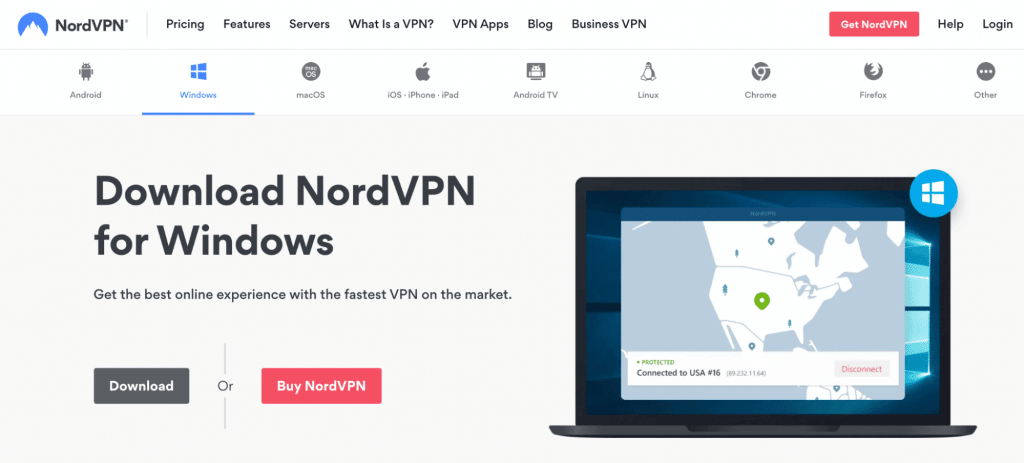
Benefit from NordVPN’s major discount on a two-year subscription, backed by their 30-day money-back promise.
- Easy to operate
- Unblocks every major streaming service
- Great savings on one- & two-year plans
- Includes a kill switch & ad blocker
- Strict no-logs policy
- 30-day money-back guarantee
- Suffered a security breach in the past
- Split tunneling isn’t available on all OSes
- Mobile UI map challenging
Best price: $3.49 per month for 24 months
NordVPN wins the top spot, and there’s one area where it’s clearly in the lead: the variety of server types. NordVPN’s buffet of specialty servers is enough to whet the appetite of even the most cautious BitTorrent user.
The double VPN feature filters your VPN connection through a second server for added security. Onion Over VPN lets you safely use the Onion network, a massive system of volunteer-operated nodes that make a connection nearly untraceable (but can be risky without protection). Obfuscated servers scramble the metadata to conceal the fact that you’re using a VPN at all, which is handy for evading censorship.
But we’re here for the torrenting servers. P2P servers can be a double-edged sword. They frequently corral torrenting users onto a few nodes, straining those servers to the breaking point. However, NordVPN has taken the time to build its P2P servers right, adding security while working just as quickly as the regular servers, if not more so.
And those servers are fast. NordVPN is fast enough for the vast majority of torrenting downloads. On top of all that, NordVPN is committed to privacy from the word go, letting users pay with cryptocurrency to avoid giving anything away. Its kill switch is also in great working order, able to immediately shut down your internet if your VPN connection drops.
To learn more, visit NordVPN’s pricing page, or see my full NordVPN review here on PrivacyJournal.
2. Surfshark — Best Cheap VPN for Torrenting
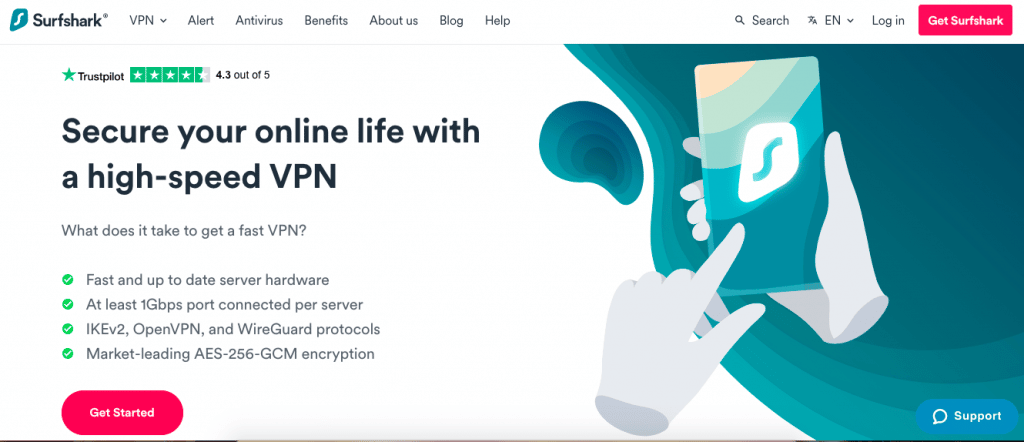
Surfshark’s most attractive offer comes with a significant price cut.
- Very good price-performance ratio
- High security level
- Netflix-compatible
- Unlimited simultaneous connections
- Great support with live chat
- No information on individual servers
- Can have issues establishing a connection
Best price: $2.49 per month for 24 months
The biggest draw of Surfshark — no matter what you plan to do with your VPN — has to be the unlimited connections. If you pay for a plan, you can connect as many devices as you want with no strings attached. It’s no surprise Surfshark is the best VPN for multiple devices.
That’s great for everybody, but this VPN service throws more than a few bones to torrenting users as well. It supports a great selection of security protocols, including WireGuard, OpenVPN, IKEv2 and Shadowsocks (an obfuscated protocol similar to VyprVPN Chameleon). They’re all paired with the strongest AES-256 encryption (or ChaCha20 encryption for WireGuard).
There aren’t any P2P servers, but Surfshark allows torrenting through every server, with no throttling or hidden obstacles. All servers have competitive speeds, with the nearest data centers having essentially no impact on browsing performance. Surfshark is clearly putting work into covering the globe with a diverse network, having recently added servers in Nigeria, Indonesia and Kazakhstan.
If I’ve got one complaint (well, one real complaint other than the shark thing), it’s about Surfshark’s version of split tunneling. It’s a great app with the power to allow both web pages and internet-capable apps to run outside the VPN. However, it’s only available for Windows and Android users, so many customers don’t get access.
Surfshark is new, though, and there’s hope that improvements will keep coming as thick and fast as they have so far. To try it for yourself, visit the pricing page or peruse the complete Surfshark VPN review.
3. ExpressVPN — Best User-Friendly VPN for Torrenting
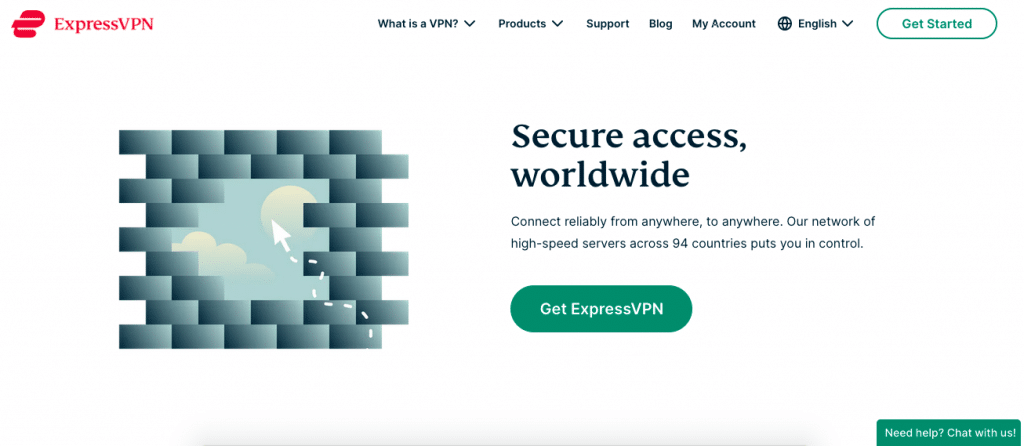
Register now to receive a substantial discount for the initial two-year period.
- Extremely fast & easy to use
- Servers in 105 countries
- Kill switch, split tunneling & no logs
- Unblocks all major streaming services
- Excellent security record
- Expensive
- Uses some virtual servers
Best price: $6.67 per month for 15 months
You won’t find many open mentions of torrenting on ExpressVPN’s website, but don’t be fooled: the perennial champion is one of the best when it comes to P2P file sharing.
Let’s start by checking out its selection of security protocols. ExpressVPN supports OpenVPN over TCP or UDP, IKEv2 and L2TP/IPsec. It doesn’t support WireGuard, but for a good reason: Lightway, ExpressVPN’s exclusive protocol, leapfrogs WireGuard (it’s even open source). Every protocol is paired with AES-256 encryption, and Lightway even supports ChaCha20.
Then there’s the no-log policy, which is backed up by a spotless record. ExpressVPN is based in the British Virgin Islands to take advantage of that territory’s lack of data retention laws. It also started the trend of saving necessary user records on RAM instead of hard memory, causing them to be wiped clean around once per hour.
Speeds are incredible. About the only VPN software faster than ExpressVPN is Hotspot Shield, which got that fast by making a pact with Lucifer (see the details in my Hotspot Shield review). ExpressVPN also has an expansive server network, with locations in 105 countries — meaning more users around the world have access to those blazing speeds.
It doesn’t matter that ExpressVPN has no features aimed at torrenting because the entire VPN service is optimized for torrenting. Other VPNs talk, but ExpressVPN walks.
4. VyprVPN
A good P2P VPN on a great trajectory
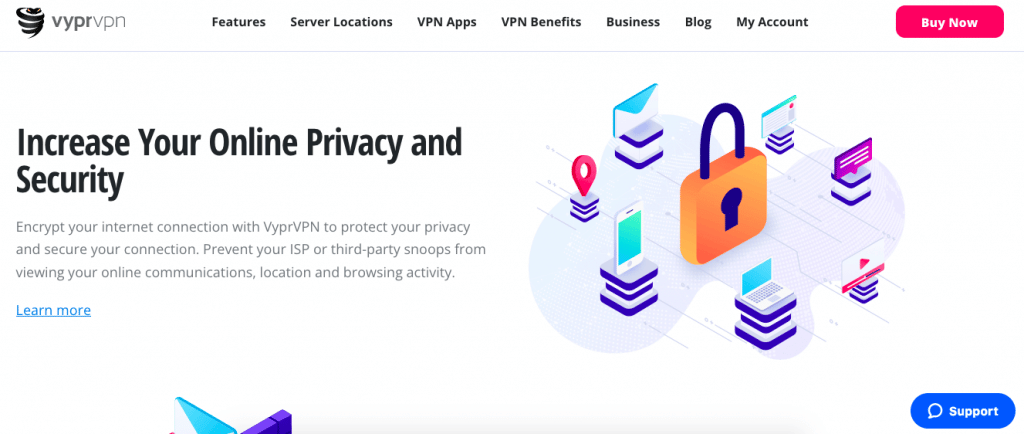
- Excellent security protocols
- Easy setup on every app
- Great at unblocking streaming sites
- Affordable prices
- Exclusive DNS infrastructure
- Slow speeds with faraway servers
- Relatively small server network
- No anonymous subscription options
- No Firefox browser extension
Best price: $5 per month for 12 months
VyprVPN is a VPN service I’ve been paying a lot of attention to lately. At a time when the VPN market is more crowded and less trustworthy than ever, it’s still working to constantly improve its privacy, security and performance.
Its performance isn’t quite there yet. VyprVPN isn’t all that fast, though it’s perfectly quick if you live near a server. But what really sets it apart as a torrenting VPN is its dedication to security and privacy, which are more important than speed in the end.
VyprVPN was founded by a husband-and-wife team enraged by the NSA’s infamous Room 641a, a base in San Francisco where the intelligence agency spied on AT&T users without their knowledge or consent. The VPN turns their ideals into a rock-solid privacy policy, along with Chameleon, an in-house protocol that combines decent speeds with unbeatable obfuscation.
VyprVPN doesn’t have any servers optimized for P2P, but it’s hardly a problem. Every server I tried worked perfectly well for torrenting in my tests, though downloads dragged a bit on the largest files. The lack of a kill switch on VyprVPN’s mobile apps is my only real concern; I wouldn’t suggest using this VPN to torrent via your phone.
If you’re interested, see VyprVPN’s pricing or take a look at my full VyprVPN review.
5. CyberGhost
The VPN for privacy geeks
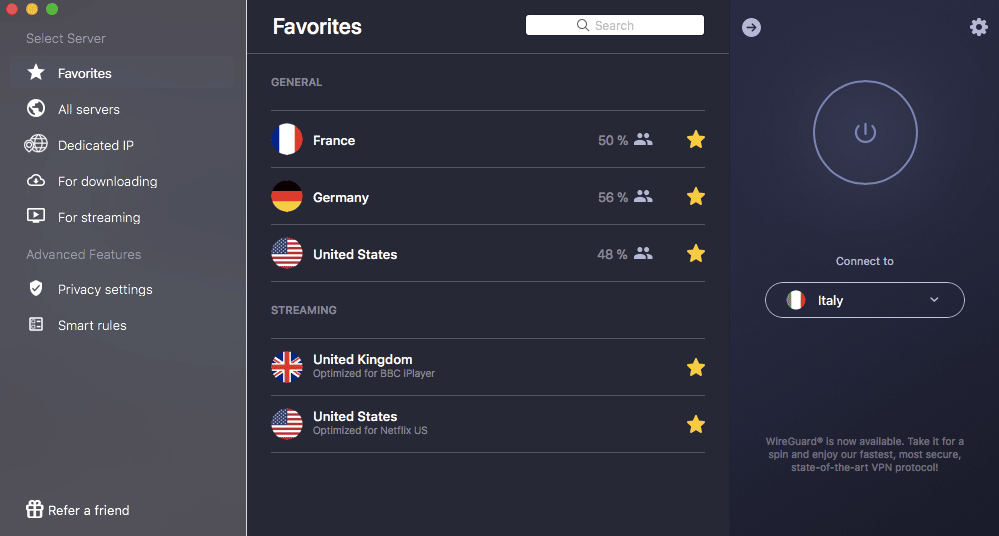
- Easy to use
- Thousands of servers including streaming servers
- Strong encryption
- Doesn’t keep logs
- 45-day money-back guarantee
- Cheap only with long-term subscriptions
Best price: $2.37 per month for 24 months
CyberGhost’s target audience is the kind of people you’d expect to see torrenting. With this VPN, you get more control, more advanced features (a kill switch is the least you’ll get), and more flexibility than almost any other VPN on the list. The downside is that it’s somewhat impenetrable to new users; CyberGhost is more for the experienced VPN users.
CyberGhost allows P2P file sharing on all of its servers. However, some servers are better built for torrenting than others. There are enough of these optimized data centers to prevent almost all risk of bottlenecking. In fact, whatever server you choose, this VPN runs like a dream — I had to go halfway around the world to find a server with limited speeds.
Other than some aspects of the UI, the only drawback here is the limited selection of security protocols. CyberGhost has gone all-in on WireGuard, which is the only protocol most of its apps support. To get OpenVPN, you have to set it up manually. There are also no protocols that obfuscate your VPN use, making CyberGhost a riskier choice for countries where torrenting is illegal.
Still, this is one of the strongest VPNs for torrenting overall. For details, see CyberGhost’s pricing page or read my full CyberGhost review.
Honorable Mention: ProtonVPN
A great service for torrenting, but it needs work in other areas
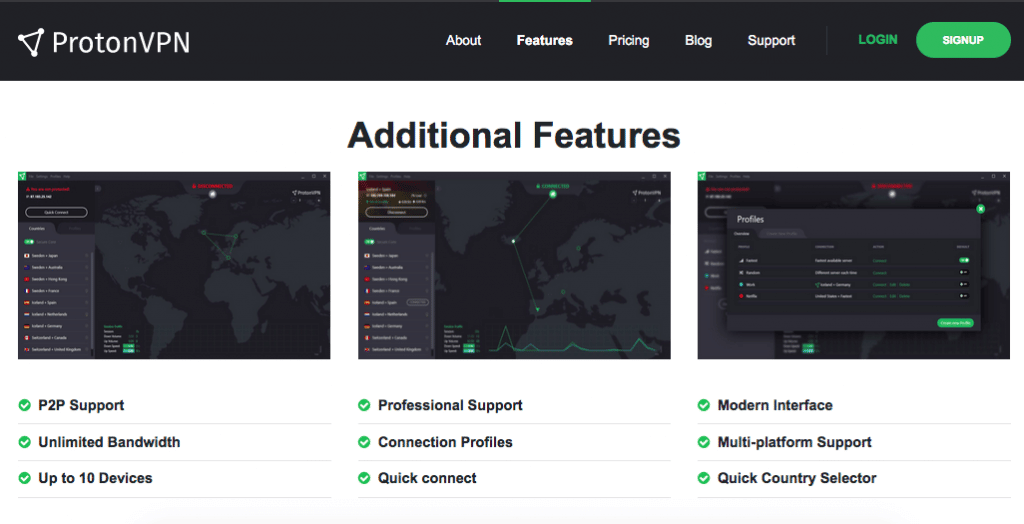
- Strong free plan
- Commitment to privacy
- Kill switch and split tunneling
- Slow speeds
- Complicated pricing
- Small network
- Limited protocol selection
Best price: $4.99 per month
ProtonVPN is the first VPN to be successfully community-supported. It’s the brainchild of the same team that built ProtonMail, the first email client with zero-knowledge encryption (where even the operators can’t decrypt your messages). Did I mention they worked at CERN? It’s a pretty badass bunch of folks to have on our side.
Given that origin story, I wish ProtonVPN worked better, but it’s sadly not very fast. Every server had a noticeable impact on my connection speed, even the ones close by. You’re stuck with OpenVPN as your protocol, which usually isn’t a problem, but IKEv2 or WireGuard might have helped out with speeds.
Still, it’s a bit too slow for torrenting. I wanted to mention ProtonVPN for one reason: it’s one of the only free VPN services I trust for file sharing. The free plan is restrictive, with a speed cap and restrictions on which servers you can use, but at least it’s secure and private.
If that piques your interest, see ProtonVPN’s pricing page for more information or read the full ProtonVPN review.
How I Chose the Best VPNs for Torrenting
Today, there are more VPN services on the market than ever before. They may be the only thing on the internet more numerous than CRM apps and Games Your Girlfriend Will Hate. When you’re after a torrenting VPN, how do you pick winners out of such a crowded field?
Generally, the best VPNs are the best in every category — it’s hard to think of an area in which I wouldn’t put NordVPN at number one. But below the very top, different VPNs come out ahead in different situations. For torrenting, you’ll want to look for excellence in a few areas. I’ve arranged them below in rough order of importance.
Security
You need to make sure the VPN is actually going to protect you. The purpose of a VPN is to conceal IP addresses and any sensitive information you transmit online. In particular, you need a guarantee that your ISP won’t be able to connect you with any use of a torrenting client.
VPNs protect you by masking IP addresses and providing encryption. When connected to a VPN, your internet connection starts at your router and goes to a VPN server. It’s encrypted the moment it arrives, so all your business is done inside a protective tunnel.
Look for a torrenting VPN that supports one of the strongest security protocols: OpenVPN, WireGuard, IKEv2 or a well-regarded exclusive protocol such as NordVPN NordLynx. Encryption should be either AES 256-bit or ChaCha20.
Before committing to any VPN service, take advantage of its free trial or money-back grace period to test its security using whatismyipaddress.org. Connect to the VPN, then visit the website and see if your IP address matches the one on the VPN client. If it doesn’t, or if it shows your real location, the VPN isn’t secure.
Privacy
The biggest flaw in the VPN model is that the VPN provider itself can see all your information, even when nobody else can. Users have to trust the VPN provider to not take advantage of its privileged position. Most VPN services have a privacy policy on their website, usually swearing up and down that they don’t log your information.
Cultivate the ability to read these policies closely. Some of them carve out exception after exception until their no-log policy isn’t worth the pixels it’s printed on. The better VPNs back up their policies in the real world. Common actions include undergoing a third-party privacy audit or automatically wiping servers every hour.
Your best weapon here is the news. If a VPN has been caught with its hand in the personal data cookie jar, it won’t stay secret for long. Find some outlets you trust, and monitor them for any news about your chosen torrenting VPN. No news is good news.
Allows Torrenting
Almost all VPNs allow their users to torrent or at least don’t do anything to prevent it. But a select few explicitly forbid torrenting, including TunnelBear, Astrill, LibertyVPN and Kepard.
Other more insidious VPNs claim to be torrent-friendly but secretly throttle any connection using a P2P client. The only way to spot these is to check with trusted sources. All six VPNs on my list are guaranteed not to throttle or suppress file sharing.
Kill switch
This is a vital security feature for torrenting. If you lose your connection to the VPN for any reason, the kill switch cuts off your internet access at the exact same moment. You won’t risk exposing yourself to your ISP even for a microsecond.
Speed
Torrenting is designed to save bandwidth, but a faster download rarely hurts. Look for VPNs with a reputation for maintaining quick browsing speeds. If possible, use speedtest.net to check the speeds for yourself.
One caveat: don’t sacrifice security or privacy for speed. Take PPTP, the worthless layabout cousin of the VPN protocol world. It’s the fastest of all, but only because it comes with no encryption whatsoever. You can do anything fast if you don’t care about doing it well.
Server Network Size
The server network is related to speed. The closer you are to a VPN server, the faster your connection will work — expect to see significant drops if you connect outside your continent.
Most VPN servers are based in North America or Europe, so users’ cups on those continents runneth over with servers. East Asia is also usually fine, but if you’re in Latin America, Africa or South Asia, you’ll need to look a bit harder for a data center near you.
Luckily, most VPN providers list their servers on their website, so you can make sure there’s one relatively near you (500 miles max) before you subscribe.
Split Tunneling
Although this nifty feature is optional, it sure can help. With split tunneling, you can choose which online apps connect via the VPN and which run unprotected. You can set BitTorrent to route everything through the VPN, while harmless apps like online video games remain unprotected to run faster.
Torrent-Optimized Servers
Some VPNs have servers configured to make P2P sharing faster and easier. In my experience, outside of NordVPN and a few others, these servers are rarely different from the rest. But if it matters to you to have servers optimized for torrenting, it’s something you can look for.
Ease of Use
If you’re torrenting, you’re probably fairly tech-savvy. Still, the more convenient a VPN’s UI is, the less likely you are to wonder what the harm would be in going without it just this once.
How to Use a VPN for Torrenting
Using a torrenting VPN is relatively simple, but the consequences for messing up can be severe. Follow these steps to be sure you’ll never go wrong.
1. Download a VPN
Go to the website of your torrenting VPN of choice and set up a paid subscription (I don’t recommend choosing a free one; see the next section to learn why). Once you have an account, download the VPN’s client onto the device you’ll use for torrenting.
2. Connect to a VPN server
Use the torrenting VPN app to choose a server with good speeds, then connect. Wait until you get a clear signal before doing anything else.
3. Download a torrent client
The BitTorrent system is the universal basis for torrent traffic. However, BitTorrent’s client app is different from BitTorrent itself, and it isn’t the only client that lets you access the system. Alternatives include Vuze, qBittorrent, Deluge, µTorrent (though I can’t recommend that one) and several others.
DO NOT download the client — let alone open it — without your torrenting VPN running. Even visiting a torrenting website without protection can attract your ISP’s notice.
4. Search for torrent files
You’ve got two main sources for downloading torrents: host websites that post specific torrent files or search engines like The Pirate Bay that catalog torrents from across the web. Either way, make sure to check the comments and ratings before downloading anything, even with your VPN on — the torrenting world is rife with malware.
5. Download the torrent
The file should end in a .torrent extension. Once downloaded, the torrenting client will use the instructions in the .torrent file to pull your data from across the network and assemble it into a file.
6. Only disconnect from your VPN when the torrenting client is completely shut down.
If your VPN comes with split tunneling, consider leaving it on for your torrenting client 100% of the time. You can’t be too safe here.
Can I Use a Free VPN for Torrenting?
Yes, you can use a free VPN. It’s physically possible, but I strongly advise against it.
All free VPNs are either strictly limited, outright scamming you or — in some cases — both. The best ones, including Windscribe and ProtonVPN, are “freemium” services where you can pay to get better features.
The others are making money by spying on their users and selling their personal info to advertisers. Don’t count on them not to give up your IP addresses to a copyright troll either.
Think of it this way: Would you rather spend under $5 every month on a VPN or $3,000 to settle a disingenuous copyright lawsuit?
Conclusion: Best VPNs for Torrenting
As an online security counselor, I maintain strict neutrality. It’s not my job to tell you what you should or shouldn’t be doing on the internet. What you choose to do with your BitTorrent client is not my business.
My only angle is this: Whatever you’re doing, do it safely. Torrenting with a VPN is the smart thing to do. If you ignore this critical step, you’re compromising your own safety. My best recommendation is NordVPN. There’s no need to hesitate — NordVPN’s 30-day refund policy allows you to experience its benefits firsthand without any long-term obligation.
Got a favorite torrenting VPN that you didn’t see on the list, or any torrenting tips you’d like us to know? Post it in the comments! Thanks for reading, and I’ll see you next time.

Leave a Reply